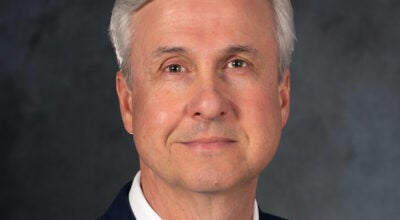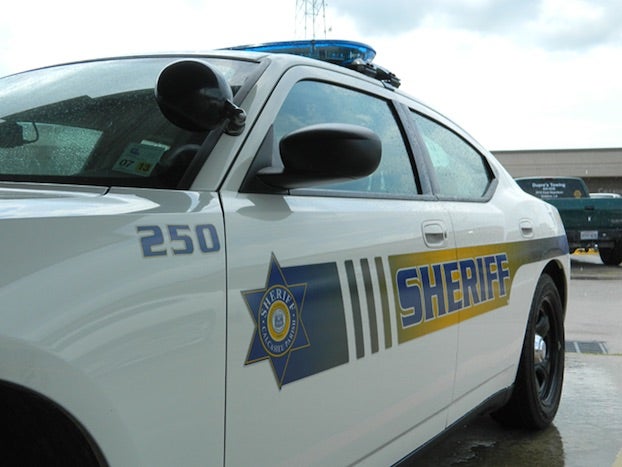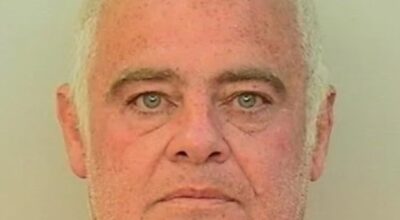A front-row seat to greatest show on Earth
Published 8:08 am Sunday, July 7, 2013
Responding to ambulance calls, delivering babies, assisting in autopsies and digging graves were all in a day’s work for 16-year-old Zeb Johnson.
Something about the funeral home business kept bringing him back to it for years, and in 1976 he carved out a permanent place for himself with the opening of Johnson Funeral Home. He’s quick to say that he’s “had a front-row seat to the greatest show on Earth.”
“Being a funeral director, being able to help people in the time of a crisis and working with the Coroner’s Office, I would do both of those jobs even if they didn’t pay me,” said Johnson, 64. “I should be paying admission to be able to do this. The rewards are so great to me personally.”
Career beginnings
Before going to work for a funeral home in about 1965, Johnson was digging ditches for his dad, a plumber. He said “anything sounded better than digging ditches.”
Johnson soon went from digging ditches to digging graves at a local funeral home.
“When they saw how big I was they said, ‘Well, you can do a lot of things around here,’ ” he said. “So, they gave me a suit, and that’s where it started. I never went back home.”
At that time, Johnson said funeral homes also ran ambulance services, and that piqued his interest. “What kid doesn’t want to ride in something with the red lights and sirens on,” he said.
Johnson said he washed cars, set up tents and dug graves during the day and responded to emergency calls in the ambulance at night. He said someone would take him from the funeral home to school and be there waiting to pick him up to take him back to work afterward.
Johnson said the “friendly competition” is one thing he remembers most about the ambulance services. “The funeral homes would see who would get on the site first,” he said. “It was always interesting.”
At 17, Johnson delivered his first set of twins and delivered 14 babies by the time he was 21. He said he was “always scared to death” when delivering babies.
“I have people come up to me today introducing me to their grandchildren, and I actually delivered some of the older people. Now they’re showing me their grandchildren,” he said. “I can remember delivering all of them, some in the back of a car or on the bathroom floor.”
Funeral homes stopped providing ambulance services around 1971, something Johnson said he was happy about. He worked at the funeral home until he enrolled at McNeese State University to pursue an associate degree in mortuary science. He graduated in 1969.
Law enforcement career
Johnson was already a licensed funeral director, but went back to McNeese in 1970 for a degree in medicine. After enrolling, the Lake Charles Police Department allowed some students to work the night shift, something he did for about 18 months.
“We would go to school during the day, sleep in the afternoon and then go back to work,” he said. “But I was married with a couple of kids, and it was a struggle on a policeman’s salary.”
During that time, Johnson’s father died and he had to help his family take care of the arrangements. He was soon drawn back into the funeral business.
“That’s kind of been the story of my life — the funeral home and the Coroner’s Office,” he said.
‘Golden opportunity’
In October 1976, Johnson Funeral Home opened with a chapel and two staterooms. He said his “golden opportunity” came when an insurance company was willing to lend funeral homes money to start their own businesses.
“I felt like there was a need and there was more that I could do to help people if I were the owner making the decisions,” he said.
The early years of owning his own funeral home weren’t easy, he said. Johnson ran a one-man show for several years with help from his family before he could afford to hire a support staff.
“It was difficult — seven days a week, 24 hours a day, no holidays or family vacations,” he said. “When one funeral was over, I would literally have to dig the graves, put the tents up, wash the cars, vacuum the building and then start all over again.”
Johnson said he performed 200 funerals in his first year, something he said is “unheard of” for a new funeral home. He now averages about 600 funerals annually.
“I was the only one here to do the embalming, the dressing and waiting on families. It was a tough job. I look back now and I think, ‘I don’t know that I could do that again.’ ”
Before opening Johnson Funeral Home, he said the idea of helping people kept luring him back to the business throughout the years
“This is the most personal and private time in someone’s life,” he said. “They are totally devastated, and sometimes I feel very inadequate trying to talk to people who have had a death. I worry about what I am going to say and do, and how I can best help.
“The idea at times that I have to remind myself of is that I am the best person to be there to give these families advice and when we go through this process, I can just hug them and hope that I have helped.”
Even after being in the business for nearly four decades, Johnson said he’s “never gotten over the grief” he sees every day.
“Sometimes, after a very emotional funeral, I lock myself in the bathroom and just stand there because it’s so emotional,” he said. “Sometimes you just can’t get that out of your system. Funeral directors grieve, too, and it’s hard.
“I think we cope with all the grief by knowing that we did everything we possibly could to help the family, and we have to realize that there will be another family that needs us, too.”
The “greatest” thing about his career is “the personal service,” he said.
“I enjoy that these people become family and my staff has become family,” Johnson said. “Helping people is very addictive.”
Today, Johnson Funeral Home has grown to include two large chapels, two staterooms, two arrangement offices, two selection rooms and a large family lounge. The demand for cremation pushed Johnson to build the Lake Charles Crematory, which serves funeral homes in six parishes.
More recently, Johnson purchased Robison Funeral Home in Sulphur and acquired Miguez Funeral Home in Jennings. He’s quick to attribute his success to his “faithful and loyal” staff.
“I have the greatest staff in the world,” he said. “Several of my staff have been with me almost 30 years. I believe that is the secret to our success.”
Funeral director Mark Bordelon has worked with Johnson for 18 years. He said his job is like “working with family.”
“(Johnson) treats me like a son,” Bordelon said. “He does a lot for the community, and he enjoys doing it.”
Giving back
Johnson, who “grew up in a poor family,” said his childhood has influenced some of his policies at the funeral home. One policy says that service is provided free of charge if a child dies.
“We had all we needed, but we had to work hard for it,” he said. “I had a brother that was born with a serious heart condition, and there was the question whether he was going to live or die. I remember my mother crying and saying, ‘I don’t know how we are going to pay for this.’ ”
Johnson’s brother underwent open-heart surgery that cost $6,500. He said his family had to borrow money from the bank to pay the bill.
“I remember going with my dad to the bank when he had to ask to borrow money to pay the bill,” he said. “The president of the bank got up, shook his hand and told him to go to the teller and they’ll give him the money. He never signed any paperwork or anything.”
Johnson said it was a moment he always remembered.
“When I got into this business, I said, ‘If I can be that person to help someone, then I am going to do that.’ From that day on I’ve always thought that it was more important to help during times like that.”
Johnson said his policy not to charge families who lose a child has been in place for years.
“Most of the time, it’s their first child and it’s very devastating,” he said. “This is a family that has looked forward to this pregnancy for nine months. Then, all of a sudden, after nine months of elation, the doctor comes out and says your baby died, and that joy is taken away from them.”
Johnson said the policy exists because he “wants to be part of the solution, not the problem.”
“I do that to help them, but it makes me feel better, too, because I want to do something to contribute,” he said. “I know that the biggest percentage of families who lose a child, those marriages end in divorce. It’s a very difficult time for families. I feel, by not charging them I can help ease some of their burden.”
Hurricane recovery
Johnson and a team of people also aided in the recovery, identification, and burial or reburial of hundreds of bodies after Hurricanes Katrina, Rita and Ike. After Katrina, he said he and a team of six went to New Orleans, where they were met by a truck with 35 bodies in the back of it.
“I knew right then that we were in for a long haul,” he said.
Johnson spent three weeks in New Orleans picking up and identifying casualties of the storm. His described his time there as “a nightmare.”
Less than a month after Katrina, Johnson was in Cameron Parish for nine months recovering, identifying and reburying bodies that were uprooted by Rita.
“There were 320 bodies counted missing from 44 cemeteries across Cameron Parish,” he said. “Not a day went by that I wasn’t in Cameron from 3 a.m. to 9 or 10 p.m. Some of these bodies floated 20-something miles away from where they were buried.”
Johnson said Hurricane Katrina was bad because of the magnitude of death, but Hurricane Rita was “a totally different thing” to deal with. “All of these people had already died, but for the families, it was doing this all over again,” he said.
Johnson said the one thing he remembers the most is seeing a women driving up in an “old beat-up pickup truck” with a few pots and pans and clothes in the back. He said her son’s body had also gone missing from the cemetery.
“I promised that woman that I would find her son, and about a week later we did,” he said. “I had the opportunity to call her and tell her that we had found his body. She hugged me and told me that was the only thing she had left. That’s why we did it; we did that for her and everyone just like her.”
Johnson said 310 of the 320 bodies were recovered. On May 14, 2006, the day the last body was laid back to rest, he said he left unable to fathom what he and his team had accomplished.
“It was dark when I was driving away from that cemetery on the last day,” he said. “I looked back and I said, ‘I don’t think I could do that again.’ ”
Johnson would be doing the same work after Hurricane Ike made landfall in 2008. He said it was a “devastating” process to do all over again.
Johnson said his experience after Katrina and Rita was “the most devastating and heartbreaking” in his career.
“That was probably the hardest year of my life — Katrina and Rita,” he said. “That was something you can’t just leave behind. Mentally, I don’t think any of us who did that will ever recover 100 percent. It’s something that will probably never really leave us.”
Coroner’s Office
Johnson’s early days in the funeral business driving an ambulance initially led him to the Coroner’s Office.
“We would bring a body to the coroner where it needed to have an autopsy done,” he said. “We would wait for the pathologist and stay and help with the autopsy.”
He started helping with autopsies when he was 16 and continued for nearly four years.
“It was unbelievable when one of the pathologist asked me how old I was,” he said. “They would get nervous because they never had anyone that young helping with autopsies.”
In 1977, Johnson said the Coroner’s Office asked if he would help perform autopsies because a staffer was out sick. The staffer never returned to work, and Johnson continued to perform autopsies for about six years.
In 1983, then-Coroner Dr. Charles Smith asked Johnson to help with death investigations. Johnson said he went back to school to learn about death investigations, mass fatalities and different types of death.
“That’s when I really got started in the Coroner’s Office — doing death investigations,” he said. “That’s been a great thing because I have had the chance over my life span to see a lot of changes in technology and in the way we do things, and I have been a part of those changes. That’s been gratifying to me.”
In his three decades with the Coroner’s Office, Johnson said he has seen changes in how crime scenes are recorded — the transition from flashbulb cameras to digital pictures — the advances in DNA and the use of computers to gather and share information.
One challenge Johnson said he faces as a death investigator is mentally preparing for what he may see.
“If I were driving down the street and I witnessed an accident where people were killed or seriously injured, I would be a basket case,” he said. “But when someone calls and says we’ve had a fatality or a vehicle crash with fatalities, in the little distance that I travel to the scene, I am preparing myself mentally to what I might see and what I have to do when I get there.”
As a death investigator, Johnson said he is responsible for looking at a body and determining what happened and how it happened.
“I think the greatest part of the job is determining that, but I have to mentally prepare myself to do that every time,” he said. “There are times when I can’t prepare myself well enough. I’m never prepared well enough when it’s a child involved. You can do what you have to do to prepare yourself, but when you get back in the car to drive away it can really mess you up mentally. It’s a very difficult job to do.”
Parish Coroner Dr. Terry Welke has worked with Johnson at the Coroner’s Office since 1987. He said Johnson is “more like a brother than a co-worker.”
“I probably can’t add any adjectives that haven’t already been said about him — kind, generous, dependable. I could just go on and on,” he said. “He’s just a great guy. There isn’t anything that he wouldn’t do for anyone.”
Welke said he’ll have to wait until he and Johnson retire to tell stories from their days at the Coroner’s Office.
Johnson said he hopes that when people talk about him they say “he did the best he could possibly do.”
“I’ve been able to do all of the things I have wanted to do, and when I leave here I would like for people to say, ‘He was a decent guy. He never took advantage of anyone. He’s a guy that’s going to be missed,’ ” Johnson said.
“I want people to know that I really cared for them and that I did everything I could to help every family that has come to me. I hope I have touched lives and made life better for all of them.”
Zeb Johnson. (Rick Hickman / American Press)





